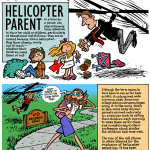 You may hear a lot about the term “Helicopter Parents”, “Monster Parents” and “Free-Range Parenting”. How much do you know about these terms? Do you know the difference between them? You will know more about the definition, the origins, the characteristics, the consequences and the possible solution for “Helicopter Parents” in this articles.
You may hear a lot about the term “Helicopter Parents”, “Monster Parents” and “Free-Range Parenting”. How much do you know about these terms? Do you know the difference between them? You will know more about the definition, the origins, the characteristics, the consequences and the possible solution for “Helicopter Parents” in this articles.
Definition
The term “Helicopter parents” is often used to define a group of parents who engage in the practice of over-parenting. Helicopter parents are so named because, like helicopters, they hover closely overhead, rarely out of reach, whether their children need them or not.
In Scandinavia, this phenomenon is known as curling parenthood and describes parents who attempt to sweep all obstacles out of the paths of their children.
It is also called “overparenting”. Parents try to resolve their child’s problems, and try to stop them coming to harm by keeping them out of dangerous situations.
Origins
Foster W. Cline, M.D. and Jim Fay coined and defined “helicopter parents” very precisely in a section on “ineffective parenting styles” in their 1990 book Parenting with Love and Logic: Teaching Children Responsibility. The practice of over-parenting came into its own sometime during the 1990s when parents were bombarded with news stories about child abductions, academic competition, and ultimately, competition in a global economy.
Characteristics
Helicopter parents often
- restrict their children’s activities
- have the constant supervision of children
- are being obsessed with their children’s education, safety, extracurricular activities.
- deny the need of risk management training for kids in their daily practices
- encouraged their children to spend more time indoors, instead of exploring outdoors
- are micromanaging and over-analyzing every little detail of the kids’ lives
Helicopter parents defend their parenting practices, saying that
- “they are only looking out for their children’s safety and education”
- “they are proud to be so involved in their children’s lives”
- “they can perceive child protection advantages”
Consequences
- The over-protection of their children results in failing to instill them with a sense of independence and a can-do attitude. They are becoming dependent on your advice, your time and your money.
- The over-programming of their children results in failing to allow them free time to play and explore on their own.
- The extreme risk aversion and a disproportionate paranoia, such as obesity, bad health and poor risk assessment are accepted.
- Children with helicopter parents tended to be less open to new ideas and actions, as well as more vulnerable, anxious and self-consciousness.
- Children will begin to rebel against their helicopter parents as they get older.
What should parents do
- Change your parenting practices by changing your mind
- Kids need to fail – Making mistakes will allow them to develop logical responsibilities and help them to make the right decisions in the future.
- Encourage success without helicopter parenting
- Letting your children face their own problems.
- Stop trying to save them in every situation.
- Talking your kids through their dilemmas and help find solutions (rather than solving everything yourself).
- Encouraging them to try new things — even when they are fearful.
- Allowing them to face possible failure and experience valuable lessons.
Source:
http://tweenparenting.about.com/od/physicalemotionalgrowth/g/helicopterparents.htm
http://en.wikipedia.org/wiki/Helicopter_parent
http://www.msnbc.msn.com/id/37493795/ns/health-childrens_health/t/helicopter-parents-have-neurotic-kids/#.Ty97mZi4xMI
http://www.sheknows.com/parenting/articles/849023/good-or-bad-parenting-helicoptering-parenting
